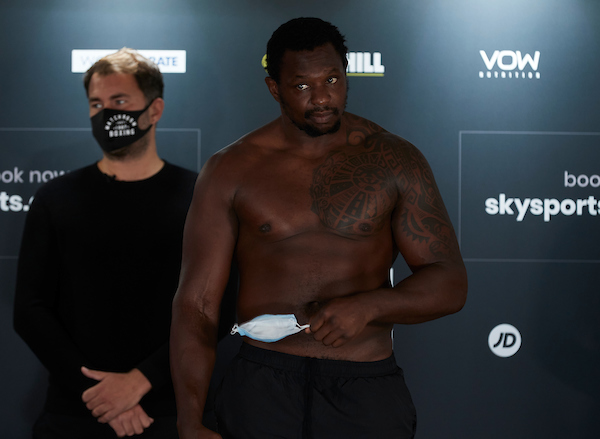Dillian Whyte is a class act

By Bart Barry-
Saturday on DAZN in a heavyweight rematch for an interim title London’s Dillian “The Body Snatcher” Whyte snatched the remainder of Russian heavyweight Alexander “Sasha” Povetkin’s body and soul in the fifth round. Symmetrically, round 5 was the same in which Povetkin unzipped Whyte seven months ago.
Whyte had before him the worst imaginable opponent, and he handled it gracefully. So often, as Americans, we watch British prizefighters on the other side of things, playing the noble loser exactly as Whyte did last August, that it was a bit disorienting to see what a good winner a Brit could be.
For let there be no doubt the most memorable and meaningful thing that happened in the ring shared by Whyte and Povetkin came after their fight ended. While I can recall plenty of acts of sportsmanship after prizefights – so many, in fact, the acrimonious way Erik Morales and Marco Antonio Barrera treated one another thrice remains exceptional as their matches – I cannot recall seeing a victor do for his vanquished what Whyte did for Povetkin. It warrants description more than any punch Whyte threw or will throw.
After Povetkin failed to rise in time and woozied his way to a corner where his handlers gathered round him Whyte strode over for a customary embrace. Povetkin was upright though barely conscious and apparently uninterested. Whyte shrugged it off, turned his back and walked away. About right, really, no man still staggering from blows to the head and the humiliation of defeat wants too desperately to be taken in a better man’s arms.
But Whyte didn’t go on a victory lap as expected. Rather he fetched a stool for Povetkin. Then he returned to the corner where Povetkin kept up an uninspired search for himself and positioned the stool beneath Povetkin, ensuring he sat squarely. It held many times what grace Whyte shows when punching. After that Whyte got a little carried away as a caretaker – “under the spell of his own sincerity”, as Philip Roth once put it – insisting on squirting water on the top of Povetkin’s head, but there’s no faulting him if he believed Povetkin’s handlers weren’t up to the task of protecting or preserving their charge.
Whyte’s fetching of Povetkin’s stool instantly joined in a library of our sport’s elegantest gestures Eddie Futch’s unfurling hand at the end of Thrilla in Manila – beautiful, simple acts contrasted dramatically by the violence preceding them.
Why might Whyte have assumed Povetkin’s corner wasn’t up to the task of caring for Sasha? Povetkin’s presence in the ring, for starters. Hospitalized twice for COVID since he coldcocked Whyte in their first match Povetkin looked like he might struggle with a breathalyzer during his ringwalk and couldn’t possibly walk a straight line after a couple minutes of moving round with Whyte.
Not enough is known yet about the lingering effects of COVID, but as aficionados we have witnessed steep declines in prizefighters known to have contracted the virus. There are few sports whose preparations require quite the cardiovascular regimen boxing does, even in the heavyweight division. The first time you spar is the closest you come to drowning on a dry surface. In short order your lungs burn, your legs hollow at the hips and your eyes start to bulge. None of these things happens during your first at-bat, your first hockey scrimmage or your first soccer practice. Boxing with perfect lungs is daunting enough. Boxing with compromised lungs? Heavens.
Povetkin did not breathe any more laboriously than Whyte did, no, but he behaved like adequate oxygen wasn’t going all the places it should. He looked worse than nonchalant before the match. Then he went through round 1 with the footwork of a firsthour foal. Whyte’s best landed punches ironically made Povetkin more stable. It was Whyte’s ferocious misses that sent Povetkin splashing about the ropes, wheeling across the purplemat.
Povetkin’s chin was all the man had for defense from the open. He had much the same offense he’s long had, a pronounced ability to concuss, but now offset by an approaching 42nd birthday and COVID. Alexander Povetkin did not belong in a prizefighting ring. Whyte sensed this but could only do so much about it. He’d been handling Povetkin pretty easily in August, too, before Povetkin lowered their curtain with an uppercut.
Whyte wasn’t shy as he might have been and deserves credit for that. Whyte might’ve made a longer and uglier night of it jabbing Povetkin and letting Povetkin’s deteriorated everything do the rest, but he went for the ice. Even so, outside the United Kingdom and its incredible vocabulary for mediocre products, Whyte had won no new fans by stopping a COVID patient. It’s what made Whyte’s remarkable act of postfight sportsmanship so important to his prospects.
Dillian Whyte is not a great prizefighter or future heavyweight champion; he is a man twice stopped by merely good fighters. But he is talented enough to catch a rusty Deontay Wilder cold and have a few Yanks cheering him whilst he does. He’ll not beat Wilder, he’ll not hear the closing bell against Wilder or Tyson Fury, as he already didn’t do with Anthony Joshua, but he’ll deserve one more sizable payday for being such a wonderful ambassador for a sport in need of wonderful ambassadors.
Bart Barry can be reached via Twitter @bartbarry